Is high fluoride toothpaste safe? Fluoride is a mineral found in water across the US and is both naturally occurring and added to water to benefit dental health.
This article will discuss the benefits and risks of high fluoride toothpaste and answer the following questions:
- What does toothpaste with high fluoride do?
- Why might you be prescribed a toothpaste with high fluoride?
- What is the best high fluoride toothpaste in the US?
- Are there any high fluoride toothpaste side effects?
We hope this article will help you better understand the advantages and disadvantages of prescription toothpaste and how they might benefit you.
In This Article
- 1 What is high fluoride toothpaste?
- 2 What does high fluoride toothpaste do?
- 3 Who needs toothpaste with high fluoride levels?
- 4 High fluoride toothpaste side effects
- 5 What are the commonly prescribed high fluoride toothpaste available?
- 6 Can you buy high fluoride toothpaste over-the-counter in the US?
- 7 Some of the best fluoride toothpaste
- 8 Conclusion
- 9 FAQs
What is high fluoride toothpaste?
Toothpaste can come containing all different levels of fluoride, and some are completely fluoride-free. The regular amount is between 1,000 and 1,500 ppm. These are usually in the form of sodium fluoride or sodium monofluorophosphate.
Fluoride is measured in PPM, which stands for parts per million. This is because the amount you need for it to work effectively is very small. Most adult toothpaste contains between 1,000 and 1,500 and toothpaste for babies and children has on average 1,000 ppm of fluoride.
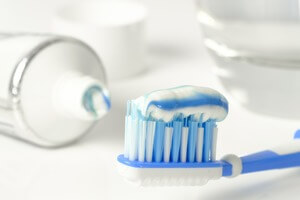
Many people are worried about giving their kids fluoride, but according to the ADA, children should use fluoride toothpaste. The ADA also recommends that adults use a 1,000 to 1,500 ppm fluoride toothpaste. However, your dentist can prescribe a toothpaste with a higher amount of fluoride that contains up to 5,000 ppm of fluoride.
A prescription for high fluoride toothpaste may be suitable for some, but remember that it isn’t a replacement for a good dental hygiene routine and regular dental check-ups.
What does high fluoride toothpaste do?
High fluoride toothpaste helps to defend your teeth against tooth decay and dental caries. It does this by remineralizing your teeth and strengthening your enamel. It also helps to defend your teeth against acids from food and drinks.
While high fluoride toothpaste can’t rid your teeth of tooth decay or reverse cavities, it can help to strengthen your enamel against decay and protect against cavities.
Fluoride toothpaste can regularly increase the fluoride content in the saliva for up to 10 hrs. This increase provides continual protection, preventing demineralization of the enamel.
The limitation of fluoride is that after visible signs of caries demineralization (such as white spots on the enamel) have appeared, fluoride’s ability to remineralize the surface is limited to slowing the caries process but not removing the white spot.
Fluoride works to remineralize your teeth by stimulating the production of fluorapatite. This is a type of enamel particularly resistant to acid and bacteria. It also has antibacterial properties that help slow down the growth of bacteria and its ability to stick to your teeth.
Maintaining a good oral hygiene routine by regularly brushing and flossing your teeth will go a long way in protecting your teeth from tooth decay and cavities. However, if you need a little extra help for any reason your dentist may prescribe extra fluoride toothpaste.
Who needs toothpaste with high fluoride levels?
A dentist has to prescribe high fluoride toothpaste containing 5,000 ppm of fluoride. This is because overuse of fluoride can cause dental fluorosis in developing teeth. To get a prescription for this type of toothpaste, your dentist needs to do a dental check-up and assess whether you can benefit from it.
The main reason your dentist may prescribe toothpaste with high fluoride is if you are at high risk of tooth decay. Generally, those at a higher risk of tooth decay include the following people:

- People who have trouble maintaining proper oral hygiene
- The elderly
- Those with a history of dental decay or currently struggling with dental decay
- People that eat a lot of high-sugar foods and drinks
- Sufferers of dry mouth
- People with diabetes
- Those with poor oral hygiene
- Patients undergoing orthodontic treatment
- Those with receding gums or in need of restorative treatment
- People who are on medications containing sugar
There are a few other reasons that you may need toothpaste with high fluoride if you don’t think you fit into one of these categories. These reasons include:
- Tooth sensitivity
- Toothache
- If you have any dark spots on your teeth
- A strange taste in your mouth that isn’t going away
It is not uncommon for a dental professional to recommend that patients have their fluoride levels tested before prescribing high fluoride toothpaste, particularly for young children and adolescents.
Your dentist should also discuss other sources of fluoride intake, such as supplements, fluoride in bottled water, and formulas to avoid excessive daily fluoride exposure.
If you think you need extra fluoride toothpaste for any of these reasons, book an appointment with your dentist. They will assess your teeth to determine if you would be a good candidate for prescription-only fluoride toothpaste.
High fluoride toothpaste side effects
There have been many studies conducted on the safety of fluoride use in toothpaste. The general consensus seems to be that they are safe when used following the manufacturer’s guidelines.
Due to high fluoride toothpaste side effects, it’s important not to swallow any. It should also not be used by children under the age of six. Children under the age of six are more likely to accidentally swallow toothpaste, which can cause dental fluorosis over time.
Dental fluorosis is when changes occur in the tooth enamel due to hypomineralization. One of the major symptoms is when white spots develop on the teeth. The following table summarizes the recommended amount of toothpaste to use and what fluoride quantities for different ages:
Age | Fluoride concentration | Amount to use |
Children under 3 | At least 1,000 ppm | A smear |
Children 3 - 6 | At least 1,000 ppm | A pea-sized amount |
Children over 6 and adults | 1,350 ppm - 1,500 ppm | A pea-sized amount |
What are the commonly prescribed high fluoride toothpaste available?
Prescription extra fluoride toothpaste can contain up to 5,000 ppm. However, there are different prescription toothpastes, each with different levels of fluoride from 1,500 ppm to 5,000 ppm.
They also include different ingredients to suit different dental needs, so your dentist will prescribe the one that best fits your circumstances.
Some of the most common types of toothpaste with the most fluoride that your dentist may prescribe include:
- Denta 5000
- Colgate Prevident 5000
- Clinpro 5000
- SF 5000 plus
Colgate Prevident 5000 is one of the highest fluoride toothpaste available, and you can only get it with a prescription from a dentist. It contains up to four times the amount of fluoride as other regular toothpaste and mouthwashes on the market.
Colgate claims it is best for those that have a high chance of dental cavities, or for those with dental restorations such as crowns or bridges.
Can you buy high fluoride toothpaste over-the-counter in the US?
The highest fluoride toothpaste otc you can buy is 1,500 ppm. To buy toothpaste with a fluoride content of over 1,500 ppm in the US, you need a prescription. Most over-the-counter adult toothpaste has on average 1,450 ppm of fluoride.
However, there are kinds of toothpaste available that are specifically designed to help remineralize your teeth, protect against cavities, or help with tooth sensitivity.
Most big toothpaste brands have a selection of fluoride toothpaste specifically designed for tooth decay prevention and tooth remineralization. They all have about 1,450 ppm of fluoride but include different ingredients as well to help protect teeth and strengthen enamel.
In the following video, Dr. Tyler discusses how to find the best toothpaste with fluoride for preventing cavities, sensitivity, and gingivitis that you can buy over-the-counter in the US:
Some of the best fluoride toothpaste
Sensodyne Pronamel Enamel Repair toothpaste
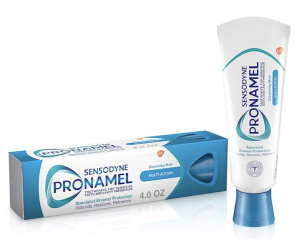
One of the best fluoride toothpaste is Sensodyne’s Pronamel Enamel Repair for daily use to help strengthen your enamel and protect against acid erosion from food and drinks.
Sensodyne claims that its unique formulation helps to lock in minerals and harden your “acid-softened” tooth enamel, which protects against tooth decay and the formation of cavities.
The active ingredients in this toothpaste are sodium fluoride (0.25%) and potassium nitrate (5%). Potassium nitrate is a key ingredient that helps with tooth sensitivity.
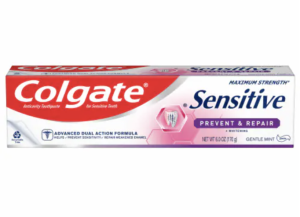
Colgate Sensitive Enamel Repair toothpaste
Colgate’s Sensitive Enamel Repair has been clinically proven to reduce teeth sensitivity and helps to repair and protect from enamel damage.
Its dual-action formula remineralizes enamel and the main active ingredients are potassium nitrate (5%) and sodium fluoride (0.24%).
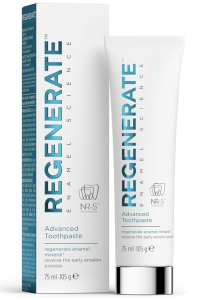
Regenerate Enamel Science Advanced toothpaste
Although Regenerate is a lesser-known fluoridated toothpaste brand, it’s formula specifically targets and reverses early enamel erosion. Its NR-5 ingredients combine to help remineralize teeth and strengthen your enamel, leaving them stronger and protecting against tooth decay.
Its main ingredients are sodium fluoride 0.315% w/w (1,450 ppm fluoride) and potassium nitrate 5% w/w.
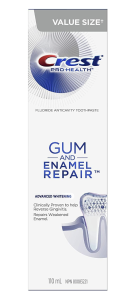
Crest Gum & Enamel Repair toothpaste
Crest’s Gum and Enamel Repair is for, as the name suggests, protecting the gums and remineralizing tooth enamel. The active ingredient in this toothpaste is stannous fluoride (10.454%) and hydrated silica for better cleaning action.
This toothpaste provides antibacterial action on the gums, protects teeth from acid erosion and helps to treat sensitive teeth.
The following table summarizes the products discussed in this article that you can buy from any store without a prescription:
Brand | Features | Price |
Sensodyne Pronamel Enamel Repair |
| |
Colgate Sensitive Enamel Repair |
| |
Regenerate Enamel Science |
| |
Crest Gum & Enamel Repair |
|
Conclusion
High fluoride toothpaste is any toothpaste that contains over 1,500 ppm of fluoride. To get this type of toothpaste, you need a prescription from your dentist. This is because toothpaste with high fluoride is not suitable for everyone, so you need a dental assessment first.
Your dentist will only prescribe a toothpaste with high amounts of fluoride if they believe you are particularly at risk or struggle with tooth decay.
This type of toothpaste is not a replacement for a good oral hygiene routine. However, some people may still struggle with tooth decay, even with a good oral hygiene routine. Some of these people include the elderly, those with diabetes, and people undergoing orthodontic treatment or in need of restorative treatment.
You cannot buy high-fluoride toothpaste over-the-counter. However, there are kinds of toothpaste available to help tackle tooth sensitivity, enamel erosion, and tooth decay.
Most big brands of toothpaste have a range to choose from and you should find one for your needs. There are also lesser-known brands that specialize in enamel remineralization and protection against tooth decay such as Regenerate.
FAQs
Does high fluoride toothpaste whiten teeth?
Fluoride is good for helping strengthen and remineralize tooth enamel. However, excess fluoride can turn your teeth yellow or brown or create white spots. This is called dental fluorosis.
Fluorosis is unlikely to be caused by fluoride toothpaste. If you choose a whitening toothpaste that contains fluoride it may help whiten teeth, but that will be because of the whitening ingredients and not the fact that it contains fluoride.
What is the toothpaste with the most fluoride?
The toothpaste with the most fluoride will have 5,000 ppm or 1.1% fluoride, and will most likely require a prescription from your dentist. One of the most common examples is Colgate PreviDent 5000.
Is high fluoride toothpaste safe?
If your dentist prescribes you this type of toothpaste and you use it according to their directions, then it is safe. You should make sure not to swallow any of this toothpaste. If not used according to directions you could get tooth discoloration, gum irritation, or allergic reactions.
Why is high fluoride toothpaste prescription only?
You need a prescription for this type of toothpaste because it can cause side effects. If your dentist has prescribed you this toothpaste, it’s because they believe the benefits outweigh the risks.
Dentalhealth.org: High Fluoride Toothpaste. Consulted 22nd April 2022.
ADA: American Dental Association Council on Scientific Affairs. Consulted 22nd April 2022.




